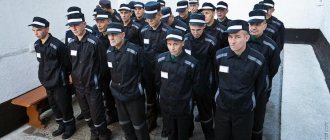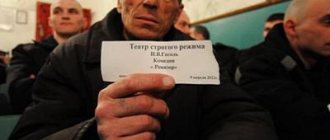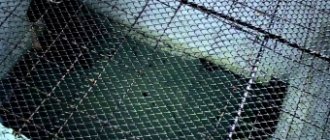Every convicted person, no matter how serious the crime he has committed, has the right to communicate with his family and friends. But after the verdict comes into force, the amount of this communication undergoes serious changes.
Short and long visits with family are becoming a rare privilege. To increase their number, it is necessary to demonstrate exemplary behavior. Any violations of prison regulations lead to a reduction in the time of communication with relatives.
As experienced wives of convicts say, in order to get a visit in prison, it is necessary to pass a large number of tests, both bureaucratic and moral and ethical.
We will tell you further how to get permission to visit a loved one who is in prison, and what surprises you should expect from this event.
How many visits is a convicted person entitled to?
The number of permitted visits depends directly on the regime in which your relative is serving his sentence.
The regime, in turn, depends on the severity of the crime he committed and his behavior in the colony. The regime and conditions of detention are dynamic; they can change depending on many factors.
All dates, regardless of mode, are of two types:
- Short-term – date for 4 hours;
- Long-term – a date for 3 days.
Both convicts and relatives favor long-term visits.
At this time, they have the opportunity to enjoy solitude with their loved one, because colony staff are present during short-term visits.
General dating
General mode is a normal mode that does not have strict restrictions. In addition, in the general regime it is possible to use lighter conditions of detention for a convicted person who is distinguished by good behavior.
Under the general regime, 4 short-term and long-term visits are allowed.
Under lighter conditions, the convicted person receives 2 additional short-term and long-term visits.
If the convicted person violates the regime or behaves badly, then the number of visits provided for by law for him may be reduced.
Dating on a strict schedule
In a strict regime, in the same way, there are both normal conditions of detention and lighter ones.
The number of permitted visits for each type of detention conditions is as follows:
- Under normal conditions - 3 long and short visits;
- In easier conditions - 4 long and easy dates.
Long visits in a maximum security colony have more stringent rules . If you are going to meet a convicted person for the first time, then be prepared for the fact that you may be forced to undress for a very thorough examination.
Special dates
In special conditions of detention everything is even more difficult. Those prisoners who are under normal conditions have the right to 2 long-term and 2 short-term visits per year. On easier terms - 3 dates of each type.
Convicts who are kept under a lifelong special regime have the right to see their relatives for a short visit only 2 times a year.
Long meetings are prohibited for them. These are especially dangerous criminals and are under heavy security.
Meeting in a colony settlement
A settlement colony is the most gentle place for convicts . There are no restrictions on meeting with family. If you wish, you can even apply for a visit outside the territory of the colony.
To stay in a pre-trial detention center, where visits are also not limited, you need to express your desire to do so. If there are places available, you will be left to work in the economic sector of the pre-trial detention center under very good living conditions. Often such places are sold for small amounts.
The investigator refused a visit to the pre-trial detention center, what should I do?
The fact is that whether or not to give a meeting with an arrested person in a pre-trial detention center is the right of the investigator and investigative authorities. It is their right, not their duty! This is the main problem, so the investigator’s refusal cannot be appealed anywhere, but you can go to court at the location of the investigative body and appeal the actions of the investigator (by law, anyone can go to court with a complaint about the actions of the investigator and his decisions), but This trial will be formal, the judge will also issue a ruling in support of the investigator’s position because whether or not to give a visit to relatives in a pre-trial detention center is given on the basis of investigative expediency and appropriateness. Roughly speaking, the court will not overturn the investigator’s decision to deny a visit.
How do investigators manipulate permission to visit in pre-trial detention centers?
Giving permission for a visit to a pre-trial detention center is also a means of manipulating the relatives of the arrested person and the prisoner himself. Remember this!
Very often, in 80% of cases, if a person does not admit his guilt in a criminal case, the investigative authorities do not allow him to see his relatives in the pre-trial detention center.
Investigators do this not because they are harmful, no, not at all, often this is an order from the leadership of the investigative body not to give a meeting to those who do not confess, especially when there is little evidence in the criminal case. (this tactic has been used since Soviet times). After all, whether or not to give permission for a meeting, the investigator first asks his supervisor (although according to the law the investigator is an independent procedural person, in practice he does nothing without the permission of the management and accepted practice).
Why is this done? It’s simple, the investigative authorities, when they have problems in a criminal case, are very afraid that a loved one might somehow put pressure on the arrested person and not allow him to admit his guilt “as if to lisp the case,” despite the fact that in all In pre-trial detention centers, those arrested often call their loved ones and have contact with them, but it is still so accepted that if they do not admit guilt, they do not have any meetings.
How to get permission to date?
Only close relatives have the right to long-term visits.
So who is allowed in? These include the following persons:
- Legal spouses;
- Parents;
- Children;
- Brothers and sisters;
- Adoptive parents and adopted children;
- Grandmothers and grandfathers;
- Grandchildren.
In theory, illegitimate wives cannot have the right to long-term visitation . But is everything so clear in this matter? How can a common-law wife get a date with a convicted person?
To get the long-awaited date, you will need to pity the head of the colony. The head of the correctional institution has the right to independently authorize or prohibit visits with non-close relatives.
Therefore, in order to go on a date, you must first submit a written request to the head of the colony.
It’s good if your husband has impeccable behavior, and the head of the colony is lenient towards other people’s requests.
To be more convincing, you can provide a certificate of cohabitation, which can be requested from the housing and communal services department.
What certificates are needed for a long visit in a colony?
What to cook for a date? Regardless of whether you are a close or distant relative, all visitors will need to undergo a short medical examination before the date.
Each correctional institution may have its own list of certificates that may be required for this.
But, in general, the following medical documents are required:
- Blood test for HIV, RW (syphilis), hepatitis C;
- Fluorography;
- Gynecologist's report;
- Conclusion of a venereologist;
- The therapist's conclusion.
The hospital and the colony itself will tell you how to obtain these certificates.
Obviously, this is done to ensure that none of the visitors can bring into the zone such serious diseases as tuberculosis, hepatitis, and sexually transmitted diseases.
In addition to medical documentation, it is required to submit documents that would confirm the fact of relationship with the convicted person and its degree. Wives carry marriage certificates, parents and children – birth certificates.
No one will be allowed on a date without an identification document.
How to make an application and where to submit it
This document is submitted to the head of the pre-trial detention center and its structure is as follows:
- in the upper right corner information about the applicant (full name, contact details and information about his passport) and about the recipient of the document (position, full name) is indicated;
- the name of the document itself is written in the center;
- Next, a request for a visit is formulated, indicating the degree of relationship with the prisoner, his full name and year of birth;
- At the end there is a signature and date of registration.
After you have received permission, you need to fill out an application addressed to the head of the pre-trial detention center.
The previously obtained permission must be attached to this paper and submitted to the pre-trial detention center. Do not expect to immediately get the opportunity to meet with a prisoner; as a rule, there is a waiting list for the right to receive them, which stretches for months. Therefore, you should be patient and wait until you are given such an opportunity.
In the same way, it is necessary to achieve long-term visits with the convicted person. This is exactly the procedure for granting meetings with a convicted person, but how do they take place?
What to take with you to prison for a long visit?
A long date in the zone is a whole mini vacation, consisting of three days. Therefore, it is worth approaching it responsibly.
You have the right to take whatever you want on a date, as long as these things are not on the list of items prohibited from being brought into the zone. The rules for the date are very strict.
It is recommended to pack the following luggage:
- First of all, take durable bags for your date. Sometimes it is a very long distance to travel to the colony itself. The roads there are also not very passable. Be sure to evaluate your strength, whether you can convey the volume of things that you plan to take.
- Bed sheets. The mattresses in the rooms provided for visits are not clean. In many colonies you can buy bed linen, but its quality also leaves much to be desired.
- Shower accessories. You will need to take shampoo, soap, toothbrush and toothpaste, toilet paper and napkins. Be sure to take flip flops and a tablecloth to protect yourself from all kinds of bacteria.
- All plastic utensils except knives. Knives in colonies are not allowed through security checks.
- Cosmetics. You can take anything that does not contain alcohol. Scissors and sharp nail files are not permitted.
- Contraception.
- Pills, but only those that are absolutely necessary. The colony staff may refuse to bring in the pills or keep them at your place, where you will take them under the supervision of security.
- Food. What products to take with you is up to you to decide. The visiting room has a kitchen where you can freely cook. Therefore, take everything you need, but be prepared for the fact that in some colonies during inspection they calmly open all the yoghurts, cut the sausages, and break the chocolates. This is done for security purposes so that prohibited items are not delivered to the colony in this way.
Do not take anything prohibited, as this may become grounds for refusing a date. Such things include money, phones, chargers, SIM cards, alcoholic beverages, documents, etc. Check all pockets in advance to ensure there are no prohibited items lying around in them.
The convicted person or his guests pay money for staying in the long-term visiting room.
The pleasure is not free, but also inexpensive. The rules for providing all benefits in this case are as follows.
You will be provided with what is called a rider, which will list items such as TV, microwave and other items along with their prices.
You will have to mark what you need from this list and pay for everything.
In general, each position costs about 50 rubles, so for two you will cost 500 rubles.
Sex on a date in prison
It's no secret that long-term dates are created, for the most part, specifically to satisfy sexual needs.
No matter how delicate this topic may be, once on a date, couples forget about any embarrassment or poor conditions and immediately begin to fulfill their marital duty.
The visiting rooms are located in a row in the same hallway, so you can easily hear your neighbors having fun.
The following circumstances often create a problem:
- In some colonies it is forbidden to close the door;
- In many colonies, several visiting rooms share a toilet and shower;
- Colonial officers often monitor the love of convicts in their cells.
Although for those who are very bored, none of the above factors stops them from wanting intimacy.
How is a short visit in prison?
As a rule, all dates begin with the transfer of food. But this is not even a meeting stage, but a separate procedure - transfer. It’s just that most often relatives combine a date with food transportation.
The food standard is set at 20 kg for 2022. Everything that was brought is carefully inspected.
The order of the meeting is as follows. A short-term visit in prison is simply like a four-hour conversation through glass. For communication there is a telephone through which you can talk. But in principle you can hear it without it.
The telephone is rather intended for those cases when several dates are taking place in the room at the same time, and a strong noise of voices is created.
The convict and his guest are sitting on chairs and talking . At the same time, there is always a colony employee present who listens to what you say.
How long does it last?
In standard situations, the time frame for long-term visits on the territory of a correctional institution is limited to three days (Part 1, Article 89 of the Penal Code of the Russian Federation, Clause 69 of Order No. 295 of the Ministry of Justice of the Russian Federation).
But in some cases, the opportunity is provided for communication for up to 5 days and with accommodation outside the colony : this applies to women with a young child - up to 14 years old, as well as men when they are the only parent. Mothers and fathers are allowed additional visits with young children on weekends and holidays.
The procedure and place of the meeting are determined in such circumstances by the head of the correctional institution. But only within the boundaries of the locality on whose territory the institution is located, and provided that the convict’s exit from the colony does not contradict the regime established in the correctional institution (Part 2.1, Article 89 of the Penal Code of the Russian Federation, Clause 69.1 of Order of the Ministry of Justice of the Russian Federation No. 295).
This benefit does not apply to:
- repeat offenders;
- persons convicted of serious crimes to long or life sentences;
- suffering from infectious diseases (such as tuberculosis, AIDS) and alcohol and drug addiction syndromes (the full list of persons is indicated in Part 3 of Article 93 of the Penal Code of the Russian Federation).
At the request of both the convicted person and his relatives, stated in writing, the duration of the meeting may be limited. In addition, with an appropriate written request from the person serving a sentence, a long visit can be replaced by a short one or just a telephone conversation (clauses 75, 82 of Order No. 295 of the Ministry of Justice of the Russian Federation). But it is important to remember that unused days “burn out” and will not be added to future dates.
How does a long meeting with a convicted person go?
A long meeting takes place in separate rooms of the colony or in a hotel, which is located for these purposes on its territory. It costs money, we have previously talked about the approximate cost of a three-day date.
On a long date, you can cook in the kitchen . Kitchens are laid out differently in different prisons. In some places, each meeting room has a separate kitchen, in others there is one kitchen for several rooms. So sometimes you have to wait in line.
There is an opportunity to go outside, watch TV and DVDs with films. For three days there is no regime for convicts; they do not have to get up early and go to formation. It's a little vacation for them.
Visiting rooms are generally dirty . Therefore, it is better to take something with you to clean tables or dishes, take clean bed linen.
There are always unpleasant odors in the room, because rooms such as the toilet, smoking room and kitchen may be located close to each other.
Every meeting for a convicted person is a holiday, and its end is a terrible tragedy. Parting with loved ones is always accompanied by tears.
Visits in prison have strict restrictions. The convicts were recognized by the court as dangerous to society and requiring isolation.
Control over their lives does not stop even when they go on short or long-term visits with relatives.
Legislative framework of the Russian Federation
not valid Edition from 22.11.2005
detailed information
| Name of document | ORDER of the Ministry of Internal Affairs of the Russian Federation dated November 22, 2005 N 950 “ON APPROVAL OF THE INTERNAL RULES OF ISOLATORS FOR TEMPORARY CONTENT OF SUSPECTS AND ACCUSED AGENCIES OF INTERNAL AFFAIRS BODIES” |
| Document type | order, list, rules |
| Receiving authority | Ministry of Internal Affairs of the Russian Federation |
| Document Number | 950 |
| Acceptance date | 01.01.1970 |
| Revision date | 22.11.2005 |
| Registration number in the Ministry of Justice | 7246 |
| Date of registration with the Ministry of Justice | 09.12.2005 |
| Status | It does not work |
| Publication |
|
| Navigator | Notes |
ORDER of the Ministry of Internal Affairs of the Russian Federation dated November 22, 2005 N 950 “ON APPROVAL OF THE INTERNAL RULES OF ISOLATORS FOR TEMPORARY CONTENT OF SUSPECTS AND ACCUSED AGENCIES OF INTERNAL AFFAIRS BODIES”
XVI. Conducting meetings of suspects and accused with defense counsel, relatives and other persons
135. Suspects and accused persons are granted visits with a defense lawyer from the moment of actual arrest. Visits are provided privately and confidentially without limiting their number, except in cases provided for by the Code of Criminal Procedure of the Russian Federation. In any case, the permitted duration of the visit cannot be less than 2 hours. Visits are granted to the defense attorney upon presentation of a lawyer's identification and a warrant. Requesting other documents from a lawyer is prohibited. If another person is participating as a defense attorney, a meeting with him or her is granted upon presentation of the appropriate ruling or court order, as well as an identification document.
A suspect or accused person is granted visits with relatives and other persons based on the written permission of the person or body in charge of the criminal case, but no more than two visits per month lasting up to three hours each. Permission is valid for one date only.
The written permission to visit, certified by the official seal, must indicate to whom and with what persons it is permitted. No more than two adults are allowed to meet with the suspect or accused at the same time.
Suspects and accused persons who are foreign citizens (subjects) are granted visits with representatives of consulates, diplomatic missions of states whose citizens (subjects) they are, as well as competent intergovernmental organizations under whose protection they are, are provided in cases and in the manner established by international treaties of the Russian Federation. Federation, as well as agreements concluded by it with intergovernmental organizations, in compliance with the Federal Law and these Rules.
136. Based on the written permission of the person or body in charge of the criminal case, as well as identification documents, the head of the temporary detention facility gives a written instruction to authorize the visit and determines its duration, taking into account the general queue, after which he gives an order to the temporary detention facility on duty to conduct it .
137. Visits are provided on a first-come, first-served basis. Before the start of the meeting, persons arriving at the meeting are informed about the rules of behavior during the meeting and are warned about terminating the meeting in case of violation of the established rules.
If it is necessary to conduct operational-search activities, meetings with the suspect, accused, held in a temporary detention facility, by an employee of the body carrying out operational-search activities are allowed, with the written permission of the interrogating officer, investigator, prosecutor or court, which is handling the criminal case.
138. Citizens who arrive on a date without identification documents or in a state of intoxication, as well as persons not specified in the permit, are not granted visits. The reasons for refusal to grant a visit are announced to the person arriving for the visit.
139. Meetings of suspects and accused with relatives and other persons (except for defense lawyers) are carried out under the control of temporary detention facility employees in premises specially equipped for these purposes through a dividing partition that excludes the transfer of any objects, but does not interfere with negotiations and visual communication.
Negotiations between suspects or accused persons with the above-mentioned persons who have arrived on a date are carried out directly or through an intercom and can be listened to by temporary detention facility employees.
140. Meetings between a suspect or accused and a defense lawyer may take place under conditions that allow a temporary detention facility employee to see them but not hear them.
141. Persons who have received permission to visit suspects or accused persons are prohibited from bringing weapons, chemical and electroshock means of self-defense, technical communications equipment, computers, film, photo, audio, video and duplicating equipment into the temporary detention facility.
142. If there are sufficient grounds to suspect that a person arriving on a date intends to unauthorizedly bring into or take out objects, substances, food, letters and notes from the temporary detention facility, he is invited to voluntarily hand over prohibited items. With his consent, a personal search and examination of things are carried out, including with the use of technical detection means.
If a person who arrives at a temporary detention facility refuses to hand over prohibited items, he or she may be denied entry.
The search is carried out in a room that excludes access by unauthorized persons and meets the rules of hygiene and sanitation, in the presence of two witnesses and a person of the same sex as the person being searched. Based on the results of the inspection, a protocol is drawn up and an entry is made in the squad list.
Prohibited items, things and food products seized during inspection are stored until the end of the visit in the temporary detention facility, after which they are returned to their owner with the following seizures:
notes and letters are not returned, but are transferred to the person or body in charge of the criminal case;
Items and substances, the free circulation of which is prohibited or limited, are not subject to return, and together with the inspection protocol and the report on the detection of signs of a crime, they are transferred to the duty officer of the internal affairs agency for registration, inspection and consideration in the manner prescribed by Articles 144 and 145 of the Code of Criminal Procedure of the Russian Federation.
143. The grounds for early termination of a visit are:
an attempt to transfer prohibited items, substances, food products to a suspect or accused;
an attempt by persons arriving on a date to transmit information that may interfere with establishing the truth in a criminal case or contribute to the commission of a crime.
144. In the event of an early termination of a meeting, the temporary detention facility employee responsible for its conduct reports this in writing to the head of the temporary detention facility, indicating the reason for the termination of the meeting.
If a meeting with a lawyer or another person participating in the case as a defense attorney is terminated, the head of the internal affairs agency orders an inspection. The inspection materials are sent to the bar association to resolve the issue of liability of the lawyer who committed the violation, with subsequent notification to the internal affairs body.
145. In the event of a temporary cessation of meetings with suspects and accused (due to quarantine, the introduction of a regime of special conditions and for other reasons), the head of the internal affairs body notifies the prosecutor supervising compliance with the laws in the temporary detention facility, the relevant judicial and investigative bodies, in A corresponding notice is posted in the reception area for visitors.











